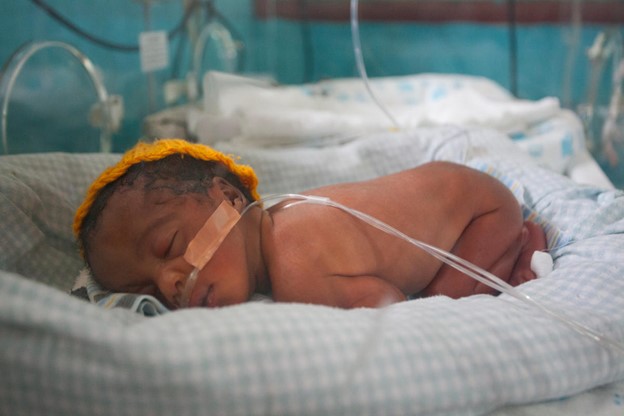Born at just 28 weeks, a fragile day-old baby entered the world with underdeveloped lungs. As the baby’s tiny chest tossed with each awkward breath, the absence of a mobile X-ray machine within the hospital led to critical delays in diagnosis.
Desperation hung thick in the air as doctors and nurses embarked on a perilous 150-meter journey to the radiology room, all while frantically trying to keep the baby alive. Every second felt like an eternity. The X-ray revealed the devastating truth: a burst lung and a heart pushed from left to right.
As the medical team raced against time, their preparedness was not enough. Not enough to deal with unforeseen emergencies, which only highlighted the glaring inadequacies of a healthcare system that fails to prioritise the lives of its most vulnerable citizens.
Unsurprisingly, this cruel testament to the failing system surrounding us is business as usual in many parts of Africa.
A Healthcare Story
In Kenya and Senegal, people can only afford an average of $83 annually for their health. That is $7 a month. That is less than the average cost of food per day in any major African city, including Nairobi.
In Nigeria, things are even worse. People manage an average of just $76 per year on their health. That is a meagre $6 a month—insufficient to buy two tall Café Latte from any Starbucks.

WHO reports while the worldwide average health expenditure is about $100 monthly, sub-Saharan Africa spends a mere $9 per person.
The inadequate spending on healthcare in countries like Nigeria has a devastating impact on life expectancy, with an average lifespan of just 54 to 62 years. This heartbreaking reality means that many parents die before their children reach adulthood. You will be lucky to see your grandchildren.
To further illustrate the disparity, let us compare Europe’s healthcare landscape with Africa’s.
Europe’s Average
Things are different in neighbouring Europe, where our politicians ran to for healthcare. In France, people spend an average of $450 monthly on their health. As a result, life expectancy is 83 years.

In Poland, people spend an average of $135 monthly on their health. The average lifespan is 78.7 years.
Genesis
Historically, Africa inherited underdeveloped healthcare systems from our colonial past. However, healthcare has taken a backseat to other pressing issues since we took over. The lack of strong political will to implement comprehensive reforms has perpetuated inequalities and inadequacies in the system.
The African Standard

Some African countries, like South Africa and Tunisia, have significantly improved their healthcare systems. South Africa boasts the highest standard of healthcare in Africa, with an index score of 64.14, according to the Health Care Index by Country 2024 report.
NB: 100 will be a perfect healthcare system.
The index score refers to the numerical value assigned to a country’s access to its healthcare system based on these factors:
- Access to healthcare services
- Quality of healthcare infrastructure
- Availability of trained medical professionals
- Health outcomes and life expectancy
- Government spending on healthcare
- Availability of essential medicines and treatments
Similarly, Tunisia has Africa’s second-highest healthcare standard, with an index score of 57.18. The country has implemented a universal healthcare system covering nearly 90% of the population and has invested in upgrading its health infrastructure, equipment, and human resources.
The Cheat Code
While average citizens in many African countries struggle with underfunded healthcare systems, the political elite often enjoy a different reality. Many African politicians and their families dip their hands into the government cookie jar to buy the best private healthcare abroad.

It is not uncommon for these leaders to frequently visit European hospitals for routine check-ups and specialised treatments. This is the stark contrast between the healthcare options available to Narcoqueens and Godfathers, aka Politicians, the general population, and the ordinary person.
Jose Eduardo dos Santos of Angola, Patrice Talon of Benin, Ali Bongo Ondimba of Gabon, and Paul Biya of Cameroon are a few examples of the hypocrisy of some of our leaders who seek medical care abroad while their healthcare systems suffer at home.
This practice is costly, risky, unethical, harmful and uncouth, resulting in an exodus of medical professionals who know they deserve better.
The Exodus
Low salaries, poor working conditions, and limited career growth opportunities drive many medical professionals to seek employment outside the continent.
The loss of healthcare professionals from African countries is a staggering reality that undermines local healthcare systems. In just five years (2017-2022), Nigeria lost 57,000 nurses abroad. That is equivalent to losing 31 nurses daily.
1,200 Ghanaian nurses joined the UK’s nursing register in 2022. 60% of interviewed Ghanaian nurses plan to leave the country. I can tell you that, on authority, the figure is closer to 100%.
Zimbabwe has been hit hard, with more than 4,000 nurses and doctors leaving since February 2021, primarily to the UK.
These statistics highlight the scale and impact of the abysmal African healthcare systems, emphasising the urgent need for action.
Tiger’s Roar

Homegrown Solutions – Be Citizens, NOT spectators
Enough of blaming our leaders. Yes, many are useless, but in most cases, we voted or selected these con artists. As individuals, we must actively participate in our country’s civic and political processes rather than remain passive observers. The problem is not always the leaders. We must take responsibility and contribute to the decision-making that affects our lives.
Did you say HOW?
- Identify and connect with local healthcare activists, NGOs, and civil society organisations working to improve healthcare access and quality in your community or country. These groups often have valuable expertise, resources, and networks that can amplify your efforts.
Visit their website, www.africahealthforum.org, to learn about their initiatives and how you can support their work. - Offer your skills, time, and resources to support the work of healthcare activists and organisations. This could include volunteering at community health clinics, helping organise fundraisers or awareness-raising events, or contributing your professional expertise in law, communications, or public policy.
Visit their website, www.nigeriahealthwatch.com, to read their articles, join their campaigns, and support their efforts. - Protest and Demand Change: When our leaders fail to prioritise healthcare and the well-being of their citizens, we must take to the streets and make our voices heard. Organise peaceful demonstrations, sit-ins, and strikes to demand better healthcare policies, increased funding, and accountability from those in power.
In conclusion
The unacceptable state of healthcare in many of our countries leads to countless preventable deaths.
As African citizens, we are responsible for demanding change. We must raise our voices, or we can complain. You choose!
The time for action is now.
As for the baby, the family’s anguish is still as tangible as a kitchen knife. Let this child’s battle spark a movement, igniting a fierce determination to build a healthcare system that protects, heals, and values every life as precious.




